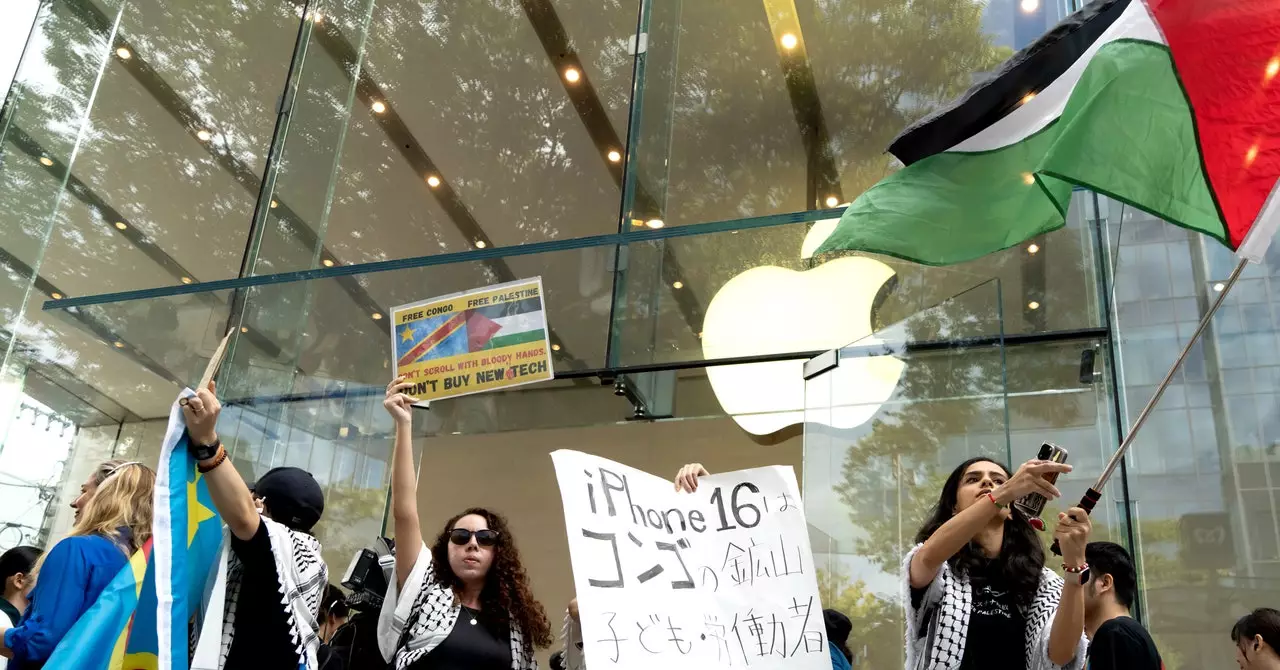The launch of the iPhone 16 last Friday brought throngs of eager customers to Apple Stores worldwide, but what was meant to be a day of celebration quickly morphed into one of protest and activism. Simultaneously occurring in multiple cities, a series of demonstrations organized by both current and former Apple employees cast a long shadow over the company’s much-anticipated product release. This confluence of commerce and advocacy highlighted pertinent ethical concerns regarding Apple’s supply chain practices, particularly regarding sourcing materials like cobalt from the Democratic Republic of the Congo (DRC).
A Call for Accountability in Supply Chains
The protesters voiced their resentment towards Apple’s alleged complicity in sourcing cobalt from mines notorious for catastrophic human rights violations, including exploitative labor conditions and child labor. Banners proclaiming that Apple was “profiting from genocide” encapsulated the severity of their accusations. While Apple has maintained that it does not engage with suppliers that perpetuate these abuses, the reality appears more complicated. Acknowledging the “challenges” in tracing its mineral supply chain, Apple has recently removed twelve suppliers for not meeting its compliance standards. Nonetheless, issues can persist, particularly in a region like the DRC where oversight is often minimal, and existing policies are not stringently enforced.
As the global market increasingly prioritizes ethical sourcing, such inconsistencies raise questions about the sincerity of corporate responsibility claims. Companies like Apple, which rest their branding on innovation and social impact, must confront the moral imperatives that underpin their operational choices. The protests reveal a growing tension between consumer expectation and corporate practice, emphasizing that technological advancement cannot be divorced from ethical considerations.
In addition to pressing Apple on its sourcing practices, the demonstrators called for the company to speak out against the ongoing humanitarian crisis in Gaza. Tying together two seemingly disparate issues—a mining scandal and international conflict—these protests highlight how interconnected today’s human rights concerns are. The organizers, now known as Apples Against Apartheid, articulated a demand for Apple to take a stand against what some human rights experts have deemed a genocide occurring in Gaza. This call to action asserts that tech companies hold a moral obligation to advocate for human rights protection, beyond simply their market transactions.
The protests occurred globally, from Bristol to Tokyo, showcasing a unified front among people who are disillusioned by Apple’s lack of engagement in pressing social issues. The eventual corporate silence regarding such crises speaks volumes to the perception that profit often supersedes ethical accountability in large corporations. As social media has amplified the voices of both consumers and critics, the dynamics of how companies engage in activism—or fail to do so—have become part of broader public discourse.
The demonstrations were largely coordinated through grassroots organizing, facilitated by small groups that included current and former Apple employees. While many protesters were not directly employed by Apple, their collective presence represented a broader discontent with corporate governance and ethical standards. The largest gathering took place in Berlin, underscoring how effective localized activism can galvanize support and increase visibility for wider-ranging issues.
Despite their intentions, the protests faced clampdowns, with reports of police interference and arrests highlighting a struggle not just for justice but also freedom of expression. Tariq Ra’ouf, a notable figure in the organizing effort, exemplified the personal risks some individuals have undertaken in their disagreements with corporate policies. With over a decade spent working for Apple, his dismissal added a personal dimension to the broader corporate ethics conversation, illustrating how passionate individuals are willing to sacrifice their livelihoods for the sake of accountability.
The Path Ahead: Consumers as Change Agents
As the iPhone 16 hit the market, the juxtaposition of consumerism and activism raised critical questions about the future of corporate practices in the tech industry. With consumers increasingly willing to hold major companies accountable for their sourcing practices and corporate social responsibility, tech giants like Apple may soon have no choice but to recalibrate their operational frameworks in alignment with ethical standards. The events surrounding the iPhone 16 launch serve as a wake-up call—reminding both corporations and consumers alike that ethical purchasing is not merely a trend, but an essential aspect of modern commerce. The determination to disrupt an iconic day for Apple signals that the fight for ethical accountability in technology is far from over, and it places power back into the hands of consumers who demand dignity for all members of the global supply chain.

